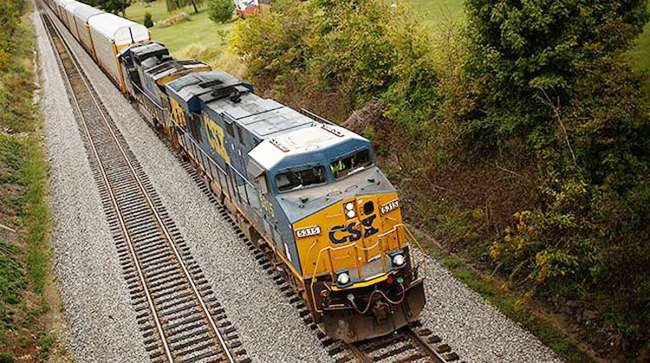Senior Reporter
Senators Laud Freight Rail Industry

[Ensure you have all the info you need in these unprecedented times. Subscribe now.]
As they advocated for additional emergency aid for transportation stakeholders, the leadership of a Senate committee touted freight railroads’ role during the coronavirus pandemic.
Commerce Committee Chairman Roger Wicker (R-Miss.) emphasized the industry’s role in maintaining operations across supply chains during a hearing with freight rail executives on Capitol Hill Oct. 21. Government officials have consistently praised the freight industry for exhibiting a commitment to deliver goods to hospitals, supermarkets and other institutions throughout the national crisis.
“The U.S. freight railroad is vital to keeping our economy running,” said Wicker. The Commerce panel oversees trucking and freight policy.
WATCH LIVE: @SenatorWicker convenes a hearing on the current status of the rail network and the track ahead.
Click to watch: https://t.co/waADHyKZmg — Senate Commerce (@SenateCommerce) October 21, 2020
“Our freight rail system is the key link between markets across the country and shipments of chemical, wood and paper products, and agricultural commodities. The freight rail network has been critical in delivering supplies to help combat the pandemic,” he continued.
Sen. Maria Cantwell of Washington, the committee’s top Democrat, echoed the chairman’s sentiment while calling on colleagues to approve additional emergency aid for freight operators, as well as other transportation stakeholders.
“So, obviously, we’ve been challenged by the COVID-19 pandemic and moving people and goods is what does keep our economy strong,” Cantwell said. “We need, in my opinion, to continue to invest heavily in rail crossing improvements that would reduce congestion and freight bottlenecks and improve efficiencies.”
The ranking Democrat also advocated for enhancing transportation workers’ access to personal protective equipment during the pandemic.
Last month, several senators joined Wicker in introducing the Air Carrier Worker Support Extension Act, which would provide nearly $30 billion for airlines, including cargo air carriers. Congress has yet to advance a new round of pandemic relief aid for the transportation community and other sectors. Congressional negotiators have not agreed on topline figures.
Frank Chirumbole, global supply chain vice president at Olin Corp., representing the American Chemistry Council, touched on proactive efforts adopted during the pandemic that promise to improve the way goods are delivered.
“We must ensure that the U.S. freight rail network is safe, reliable and resilient,” Chirumbole told the Senate panel. “Communications and transparency are critical to resolve service issues as they arise and prevent more widespread issues.”
“Virtually every railroad customer has adjusted its operations because of the pandemic, and freight railroads have partnered with them every step of the way. Thanks in part to this cooperation, America’s freight railroads today are, by and large, running more fluidly than ever before,” noted Ian Jefferies, Association of American Railroads president and CEO. “Railroads are also making special efforts to expedite shipments of goods that are in short supply or urgently needed, and these efforts have not gone unnoticed by our customers and our regulators.”
Kent Fountain, chairman of the National Cotton Council, urged senators to approve another pandemic relief measure with the aim of assisting cotton textile mills and merchants “to ensure that this critical industry remains in America.”
“Rail transportation is vitally important to the U.S. cotton industry,” Fountain observed.
Stakeholders such as highway users, port operators and public transit entities, among others, have warned of potential disruptions in service absent additional federal emergency aid.
NRPC Letter by Transport Topics
Amtrak recently told leaders on Capitol Hill and the White House that it will need nearly $5 billion in fiscal 2021. Amtrak President and CEO William Flynn wrote on Oct. 8: “Not only would deferring capital projects and procurement inhibit our ability to address the reliability and capacity needs of our rail network and impact the aforementioned corresponding capitalized Amtrak workforce, but such capital delays would also impact a specialized domestic supplier network.”
Want more news? Listen to today's daily briefing:
Subscribe: Apple Podcasts | Spotify | Amazon Alexa | Google Assistant | More




